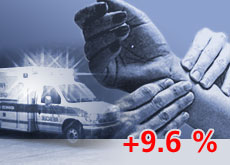Quality of hospital care is hidden from patients

Health insurers, policymakers and hospitals are at loggerheads over whether the quality of patient care should be public knowledge.
At present Swiss hospitals are responsible for carrying out internal reviews, the results of which are not open to outside scrutiny.
All public hospitals in Switzerland are obliged to conduct some sort of assessment under a federal law on health insurance and quality assurance – or else they lose their funding.
But they are under no obligation to publish their findings.
The lack of transparency is blamed on a number of factors – top of the list is the fear that a hit list of “bad” hospitals would be drawn up.
Those in favour of retaining the existing self-assessment system argue that “performance tables” could damage the reputations of some hospitals.
False data
Another major objection to greater transparency is that medical staff might feel pressured into manipulating data to boost results and cover up poor performance.
However, this argument does not hold with opponents of the current system. They say Switzerland needs a transparent, national ranking of public and private hospitals.
Health insurers, for instance, say they want access to data in order to know how hospitals are run.
They claim that up to 30 per cent of the treatment provided at Swiss hospitals is unwarranted, but they cannot do much about it because investigations are difficult.
Similarly, politicians need clear, accurate figures about the hospitals’ performance, so that they can make better policy decisions on funding cutbacks and annual budgets.
Zurich model
The scale of the task facing those demanding greater transparency can be seen in canton Zurich, where tentative steps have been taken to lift the lid on hospital performance.
In 2000 canton Zurich set up a regulatory body, Outcome, to promote a new “self-declaration” method.
The body comprises the cantonal health department, Swiss health and accident insurers and the public hospitals in the Zurich region.
Hospital administrators still carry out an internal assessment of performance, but the data is stored centrally by Outcome where it can be accessed – but only by other hospitals.
Outcome director Adolf Steinbach admits the situation is hardly ideal but says it is a step in the right direction.
“The hospitals needs a certain amount of protection so that the gathering of data can be carried out correctly,” he explained.
“We don’t want to accuse the hospital administration of any wrongdoing, but in reality no one would willingly put themselves in a public line of fire.”
Quality a mystery
Nevertheless santésuisse, the health insurers’ association, is demanding the introduction of external controls.
Spokesman Peter Marbet says the organisation wants to see “step by step” external checks introduced, including a form of certification from an independent body.
Even the Zurich health department has asked for more transparency in evaluation procedures and results.
“The association Outcome has needed up until now to create a good culture [of trust],” commented the department’s spokeswoman Marianne Delfosse.
“Now this data must be made available to at least the political policymakers and the health insurance agencies.”
swissinfo, Hansjörg Bolliger (translation: Tania Peitzker)
Statistics for 2001:
Hospitals: 364
Patients: 1.39 million
Costs: SFr14.6 billion.
Employees: 15,2200
Health care costs are rising steadily.
In 2001 they represented 10.9% of Switzerland’s GDP (5% in 1960).
Switzerland has the second most expensive health system in the OECD after the US (13.9%).
In comparison: Germany: 10.7%, France: 9.5%, Italy: 8.4% and Austria: 7.7%.

In compliance with the JTI standards
More: SWI swissinfo.ch certified by the Journalism Trust Initiative









You can find an overview of ongoing debates with our journalists here . Please join us!
If you want to start a conversation about a topic raised in this article or want to report factual errors, email us at english@swissinfo.ch.